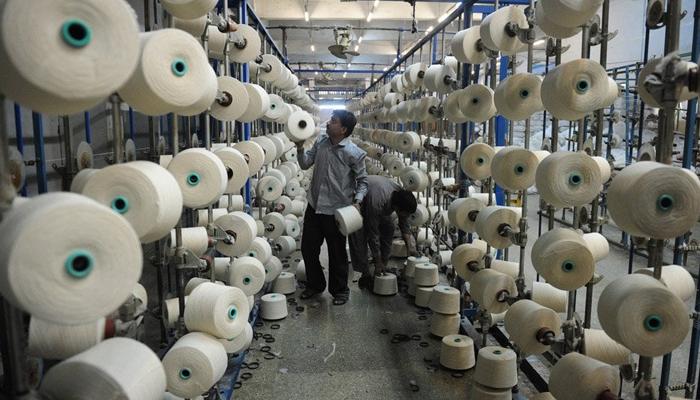Missing threads
Only one investment was made in textiles way back in1997 to produce polyester in Pakistan on heavy protection
LAHORE: There is a need to know why foreign investment in Pakistan is totally missing in the textile sector that generates over 55-60 percent of its exports and most foreign investment is parked in projects where consumption is totally domestic.
We have numerous Independent Power Producers who have invested heavily in the power sector. The investment is however, based on guaranteed return on investment at a rate many times higher than interest that banks give to depositors. Then we have heavy foreign investment in the food sector where the foreign owned companies operate on normal business practices.
The foreign companies dominate more than 70 percent of our processed milk market. There is huge investment in the banking sector as two of the three largest banks of the country are run by foreign investors. We have a big oil foreign oil marketing company. There exists a foreign owned cement unit. All these units compete on the principle of free market economy.
Only one investment was made in textiles way back in1997 to produce polyester in Pakistan on heavy protection. That practically deprived the local textile industry of increasing manmade fiber in its export products because the price charged by ICI at that time incorporated the protective duty element making it impossible for the local textile sector to compete globally and even exporters were not allowed to import it duty free.
Compared with Pakistan.
Other Asian countries received a lot of foreign investment in the textile sector that includes establishment of raw material plans and in the basic textiles and apparel sector. India received investments from western countries to establish joint venture units and nominal Chinese investment. Vietnam got a lot of Chinese investment that boosted its industry to become the third largest exporter of apparel in the world after China and Bangladesh.
The Chinese also invested in Bangladesh that also received investment from the west in the garmenting sector. The Indonesians established larger polyester plants similar to Pakistan from foreign investors without giving them any concessions that distort the market.
The foreign investors in textiles are usually attracted by the Indian states by providing the free land or a certain concession in power tariff or other small favors in special zones. These facilities are also available to the local investors except free land. We have no such facilities to offer either by federal or provincial governments. Foreign
investment in textiles did land in Pakistan when the Crescent Group established a textile composite facility in joint venture with Bowman. The partnership did not last long as the foreign investors withdrew for reasons not explained. After CPEC some Chinese investors also tried to enter into partnership with local reputable garment exporters but after going through the official documents they found discrepancies on what they were told by the local partners and they withdrew.
Chinese do see a lot of opportunities in the textile sector of Pakistan. One Chinese company is successfully exporting apparel from Pakistan. Others are hesitant because of various factors.
They do not trust local textile players and are shy to go for joint ventures. On the government side they are scared of the inconsistency of the textile policy of the country. The bureaucratic red tape scares them. They want a transparent bonded warehouse policy without interference of the bureaucracy. They want their export consignments as the proof of utilization of imported duty free materials and they want hassle free refunds without bureaucratic involvement.
-
 Lana Del Rey Announces New Single Co-written With Husband Jeremy Dufrene
Lana Del Rey Announces New Single Co-written With Husband Jeremy Dufrene -
 Ukraine-Russia Talks Heat Up As Zelenskyy Warns Of US Pressure Before Elections
Ukraine-Russia Talks Heat Up As Zelenskyy Warns Of US Pressure Before Elections -
 Lil Nas X Spotted Buying Used Refrigerator After Backlash Over Nude Public Meltdown
Lil Nas X Spotted Buying Used Refrigerator After Backlash Over Nude Public Meltdown -
 Caleb McLaughlin Shares His Resume For This Major Role
Caleb McLaughlin Shares His Resume For This Major Role -
 King Charles Carries With ‘dignity’ As Andrew Lets Down
King Charles Carries With ‘dignity’ As Andrew Lets Down -
 Brooklyn Beckham Covers Up More Tattoos Linked To His Family Amid Rift
Brooklyn Beckham Covers Up More Tattoos Linked To His Family Amid Rift -
 Shamed Andrew Agreed To ‘go Quietly’ If King Protects Daughters
Shamed Andrew Agreed To ‘go Quietly’ If King Protects Daughters -
 Candace Cameron Bure Says She’s Supporting Lori Loughlin After Separation From Mossimo Giannulli
Candace Cameron Bure Says She’s Supporting Lori Loughlin After Separation From Mossimo Giannulli -
 Princess Beatrice, Eugenie Are ‘not Innocent’ In Epstein Drama
Princess Beatrice, Eugenie Are ‘not Innocent’ In Epstein Drama -
 Reese Witherspoon Goes 'boss' Mode On 'Legally Blonde' Prequel
Reese Witherspoon Goes 'boss' Mode On 'Legally Blonde' Prequel -
 Chris Hemsworth And Elsa Pataky Open Up About Raising Their Three Children In Australia
Chris Hemsworth And Elsa Pataky Open Up About Raising Their Three Children In Australia -
 Record Set Straight On King Charles’ Reason For Financially Supporting Andrew And Not Harry
Record Set Straight On King Charles’ Reason For Financially Supporting Andrew And Not Harry -
 Michael Douglas Breaks Silence On Jack Nicholson's Constant Teasing
Michael Douglas Breaks Silence On Jack Nicholson's Constant Teasing -
 How Prince Edward Was ‘bullied’ By Brother Andrew Mountbatten Windsor
How Prince Edward Was ‘bullied’ By Brother Andrew Mountbatten Windsor -
 'Kryptonite' Singer Brad Arnold Loses Battle With Cancer
'Kryptonite' Singer Brad Arnold Loses Battle With Cancer -
 Gabourey Sidibe Gets Candid About Balancing Motherhood And Career
Gabourey Sidibe Gets Candid About Balancing Motherhood And Career




